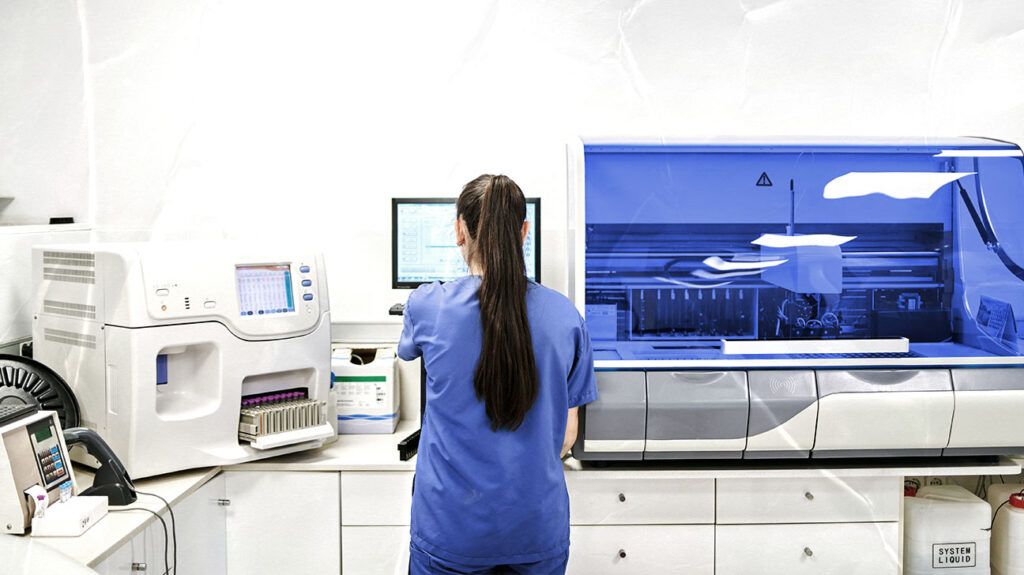Autoimmune lymphoproliferative syndrome (ALPS) is a rare condition that causes a person to produce excess lymphocytes. This can cause swelling of the lymph nodes.
Lymphocytes are a type of white blood cell that help fight disease and infection. The body creates these cells in the bone marrow and stores them in different areas, such as the spleen and lymph nodes.
If a person has ALPS, their body produces too many lymphocytes. This is called lymphoproliferation. It can cause swelling in the lymph nodes, liver, and spleen.
ALPS can also increase a person’s chances of developing lymphoma, a form of cancer that affects the lymphatic system.
Read on to learn more about ALPS, including its symptoms, causes, treatments, and more.

Lymphoproliferation due to ALPS can cause a person to experience swelling in their lymph nodes, liver, and spleen. The most noticeable swelling due to ALPS occurs in the lymph nodes of the:
Some early symptoms of ALPS include:
- fatigue
- paleness
- jaundice, which is yellowing of the skin and eyes due to liver disease
- unusual bruising
- frequent nosebleeds
- frequent infections
The
Autoimmune disorders
ALPS can also cause a person to develop certain autoimmune disorders.
An autoimmune disorder is a condition that causes a person’s immune system to mistakenly attack healthy cells. These conditions can develop several years after a person first develops signs of ALPS.
Possible autoimmune disorders that can occur due to ALPS include:
- skin problems, such as hives
- anemia, which is a low level of red blood cells
- thrombocytopenia, which is a low platelet count that can reduce blood clotting
- neutropenia, a low level of white blood cells called neutrophils that are essential in fighting infections
Less commonly, ALPS can cause a person to develop conditions such as:
- hepatitis, which is inflammation of the liver
- glomerulonephritis, which is inflammation of the kidneys
- uveitis, which is inflammation of the iris of the eye
- Guillain-Barré syndrome, which affects a person’s nerves
The FAS gene controls the cell death of lymphocytes. This helps remove lymphocytes at the end of their life cycle.
However, if a person has ALPS-FAS, their lymphocytes will not die. Instead, they will build up to excessive levels.
ALPS can also occur if a person has a mutation on a gene other than FAS, such as FASLG or CASP10. However, this is less common.
In rare cases, a person can develop ALPS later in life rather than at birth. This form of ALPS is only present in the blood, so people cannot pass it on to any children they may have.
A person with ALPS-FAS inherits it from their biological parents in an autosomal dominant manner. This means a person only needs to inherit one mutated gene from one parent to develop the condition.
The NIAID notes that a person with a biological parent who has ALPS-FAS has a
People with ALPS are likely to have family members with the condition. However, up to 40% of people with a mutated FAS gene will not develop ALPS.
The Immune Deficiency Foundation states that ALPS can be difficult for doctors to diagnose. This is because it can have similar symptoms to other conditions, such as:
- lymphoma
- leukemia, which is cancer of the blood
- chronic viral infections, such as infectious mononucleosis, or mono
A doctor may diagnose ALPS if a person has signs of an autoimmune condition alongside low blood cell counts and enlargement in their lymph nodes or spleen.
A doctor may also ask about a person’s family history when diagnosing ALPS. They may run blood tests to check for mutations in the FAS gene. Additionally, they may test a person’s blood for the following:
- increased vitamin B12 levels
- increased antibody levels
- certain proteins, such as interleukin 10 and soluble FAS ligand
There is currently
Treatment for ALPS usually involves treating autoimmune complications. These treatments may include:
- corticosteroids such as prednisone
- mycophenolate mofetil, an immunosuppressant
- sirolimus, which can help reduce the size of the lymph nodes and spleen
Lymphoproliferation and spleen enlargement caused by ALPS can be challenging to treat. However, these symptoms may not cause severe problems.
In rare cases, a person may require a splenectomy, which is the removal of the spleen. This can increase a person’s risk of infection and sepsis.
ALPS is a rare condition.
The Immune Deficiency Foundation states that there have been more than 1,000 cases of the ALPS-FAS type worldwide.
ALPS does not significantly affect a person’s lifespan. However, a person with the condition may have a highly increased risk of developing lymphoma.
The Immune Deficiency Foundation notes that prompt recognition of symptoms can be important in improving a person’s outlook. Early diagnosis can allow treatment to begin earlier.
Autoimmune lymphoproliferative syndrome (ALPS) is a rare condition that causes a person to produce excess lymphocytes. This can cause swelling in the lymph nodes and spleen. It can also cause a person to develop autoimmune complications.
People with ALPS usually have a typical lifespan. However, ALPS significantly increases a person’s risk of developing lymphoma.
It is best for people to contact a doctor if they have concerns about ALPS or display symptoms.
